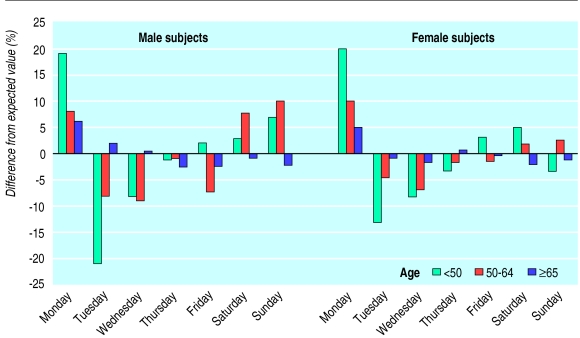A recent study in Moscow reported higher cardiovascular mortality on Saturdays, Sundays, and Mondays and linked this to the Russian pattern of binge drinking.1 Other studies have reported an increased risk of cardiac events on Mondays, a peak on other days, or no significant weekly variation.2 We investigated the patterns of death from coronary heart disease by day of the week in the Scottish population and explored possible links with patterns of alcohol consumption.
Subjects, methods, and results
Data linking all hospital discharges and deaths were obtained from the Scottish Morbidity Record and General Register Office (Scotland) respectively for all Scottish residents dying in 1986-95 for whom coronary heart disease (ICD-9 (international classification of diseases, 9th revision) codes 410-414) was the principal cause of death. Information was obtained on whether death occurred in hospital and whether subjects had been admitted to hospital with coronary heart disease since 1981. People dying in Scotland from all other causes in 1986-95 formed a comparison group. The χ2 test was used to examine differences between the observed number of deaths per day and that expected in the absence of any weekly variation. Emergency admissions to hospital in Scotland for non-dependent alcohol abuse (ICD-9 code 305.0) were used as a proxy for excess alcohol consumption.
During 1986-95, 91 193 men and 79 051 women died from coronary heart disease. Overall there was a significant weekly variation (P<0.001), with an excess of deaths on Monday (3.1% above the daily average). Subgroup analysis showed that this reflected a significant weekly variation among the 58 448 people with no previous admission for coronary heart disease dying outside hospital (figure). Within this group, the Monday excess was greatest in those aged under 50 (men 19.2% above the daily average (P<0.01); women 20.0% above the daily average (P=NS)). Men under 65 also showed a highly significant excess of deaths on Saturday (P<0.01) and Sunday (P<0.001).
There was no significant weekly variation among people with a previous admission for coronary heart disease dying from coronary heart disease outside hospital (n=18 574) and no consistent weekly trend among patients dying from coronary heart disease in hospital (n=93 222). Deaths from all other causes (n=449 345) exceeded expected values on Thursday and Friday and peaked on Saturday at 1.1% above the daily average (P<0.01). There was a highly significant weekly variation in emergency admissions for non-dependent alcohol abuse (P<0.001), consistent with a pattern of binge drinking on Friday, Saturday, and Sunday (20%, 64%, and 11% above the daily average respectively).
Comment
We found an excess of deaths from coronary heart disease outside hospital on Mondays among people with no previous admission for coronary heart disease. This excess was different from the weekly pattern in deaths from all causes. It was unlikely to be an artefact of deaths remaining undiscovered until Monday because this pattern was not seen in people with a previous admission for coronary heart disease dying outside hospital.
The Monday peak in deaths from coronary heart disease in Scotland may be partly attributable to increased drinking at the weekend, although other mechanisms, such as work related stress, may be important.2 Several potential mechanisms have been suggested linking cardiovascular disease and death with binge drinking and alcohol withdrawal.3 We observed no Monday excess in people with a previous admission for coronary heart disease dying of coronary heart disease outside hospital. This group may be partly protected from sudden cardiac death by current treatment4 or may be more likely to seek medical help at the weekend because of familiarity with the symptoms. The possible link between binge drinking and deaths from coronary heart disease has potentially important public health implications and merits further investigation.
Figure.
Deaths from coronary heart disease occurring outside hospital, by day of week, in people with no previous admissions for coronary heart disease, Scotland, 1986-95: percentage difference from expected values
Footnotes
Funding: The study was funded by the British Heart Foundation.
Competing interests: None declared.
References
- 1.Chenet L, McKee M, Leon D, Shkolnikov V, Vassin S. Alcohol and cardiovascular mortality in Moscow; new evidence of a causal association. J Epidemiol Community Health. 1998;52:772–774. doi: 10.1136/jech.52.12.772. [DOI] [PMC free article] [PubMed] [Google Scholar]
- 2.Willich SN, Lowel H, Lewis M, Hormann A, Arntz H-R, Keil U. Weekly variation of acute myocardial infarction. Increased Monday risk in the working population. Circulation. 1994;90:87–93. doi: 10.1161/01.cir.90.1.87. [DOI] [PubMed] [Google Scholar]
- 3.McKee M, Britton A. The positive relationship between alcohol and heart disease in eastern Europe: potential physiological mechanisms. J R Soc Med. 1998;91:402–407. doi: 10.1177/014107689809100802. [DOI] [PMC free article] [PubMed] [Google Scholar]
- 4.Peters RW. Circadian patterns and triggers of sudden cardiac death. Cardiol Clin. 1996;14:185–194. doi: 10.1016/s0733-8651(05)70272-1. [DOI] [PubMed] [Google Scholar]



